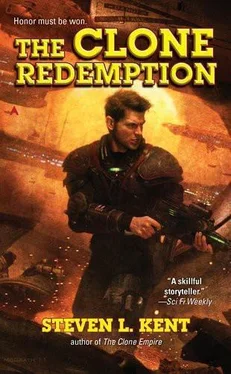Steven Kent - The Clone Redemption
Здесь есть возможность читать онлайн «Steven Kent - The Clone Redemption» весь текст электронной книги совершенно бесплатно (целиком полную версию без сокращений). В некоторых случаях можно слушать аудио, скачать через торрент в формате fb2 и присутствует краткое содержание. Жанр: Боевая фантастика, на английском языке. Описание произведения, (предисловие) а так же отзывы посетителей доступны на портале библиотеки ЛибКат.
- Название:The Clone Redemption
- Автор:
- Жанр:
- Год:неизвестен
- ISBN:нет данных
- Рейтинг книги:4 / 5. Голосов: 1
-
Избранное:Добавить в избранное
- Отзывы:
-
Ваша оценка:
- 80
- 1
- 2
- 3
- 4
- 5
The Clone Redemption: краткое содержание, описание и аннотация
Предлагаем к чтению аннотацию, описание, краткое содержание или предисловие (зависит от того, что написал сам автор книги «The Clone Redemption»). Если вы не нашли необходимую информацию о книге — напишите в комментариях, мы постараемся отыскать её.
The Clone Redemption — читать онлайн бесплатно полную книгу (весь текст) целиком
Ниже представлен текст книги, разбитый по страницам. Система сохранения места последней прочитанной страницы, позволяет с удобством читать онлайн бесплатно книгу «The Clone Redemption», без необходимости каждый раз заново искать на чём Вы остановились. Поставьте закладку, и сможете в любой момент перейти на страницу, на которой закончили чтение.
Интервал:
Закладка:
“Aye, sir.”
Then I said, “Tell your men to stay alert. If there’s anybody on this bird, they’re going to hit us as we go up the stairs. That’s how I would do it. The stairs or the cockpit.”
“Stairs and cockpit, aye, sir,” said Ritz.
A couple of men split off to check the toilets, the rest of us started toward the stairs. That was when the shooting began.
Ritz divided his men into platoons, then he broke the platoons into squads, allowing him to cover eight sets of stairs at one time. The spiral stairwells were a natural bottleneck. Even worse, they were a bottleneck with a blind spot. Anyone climbing the stairs would be defenseless as he passed through the ceiling and entered the floor above.
The stairs were wide enough for three men to climb at a time, but we stuck to procedure, offering up a point man who peered from the top of the stairs into the next deck as a vulnerable gopher climbing out of its hole.
We sent men up eight flights of stairs, and every single one came rolling back down with blood leaking from large holes in his helmet. The men guarding this bird used guns with bullets. That was good. It meant they were wearing standard armor. If they’d been wearing shielded armor, they would have fired fléchettes that left little pinprick holes.
On any other mission, we would have lobbed grenades up the stairs. We would have hit them with grenades, then come running in on the heels of the explosions to mop up any survivors. We couldn’t do that on this mission, though. We needed the barge in working condition. Even a low-yield grenade might cause the walls to buckle in this enclosed environment.
As Major Ritz pulled his men back, I sprinted aft, away from the action. As wide as the barge was, built to carry ten thousand passengers on each of its twenty-five decks, there were hundreds of sets of stairs. They’d need an entire battalion to cover every set of stairs on a bird this big.
I sprinted a couple of hundred yards to reach the far side of the deck and climbed the last set of stairs. I crept up quietly, paused just below the ceiling, my finger on the trigger of my M27. I peered up from the top of the stairs and saw a wideopen floor. I spotted the unfriendlies, but they were a long way away and very distracted at the moment. They did not notice as I continued up the stairs to the next deck.
I called Ritz once I was safely stashed one floor above the disputed deck. “Do you read me?” I asked.
“General.”
“Got any flash grenades?” I asked as I crept across the empty deck. I lay on the floor and stared down a stairwell at the attackers. They were not dressed in armor. I got the feeling they were maintenance, deck sweepers, and latrine wipers ; but I could not get a count of their numbers.
“Yes, sir.”
“Lob a couple up the stairs, then give me a few seconds to clear out the debris,” I said.
Flash grenades did not make a violent percussion. They might burn the floor, but they would not blow holes in walls or change the air pressure.
“Are you up there?” asked Ritz.
Borrowing a tactic from Freeman, I answered the question by ignoring it. Instead, I told him, “Make sure your grenadiers know which pills to throw; we can’t afford to damage the ship.”
“Yes, sir.”
“And Ritz, make sure your men don’t shoot me when they come up the stairs. I’m the only one wearing combat armor.”
“Aye, sir,” said Ritz.
I activated the tint shields to protect my eyes as I lay still and waited. Two, maybe three, seconds passed, and the explosions began, brilliant flashes that changed the atmosphere from brightly lit to blinding. I only saw a trace of the flash through the tint shields. The glare evaporated quickly, and I switched back to tactical vision as I leaped down the stairs.
The two nearest men to me lay squirming on the floor. I shot one. The other climbed to his feet, leaving his gun on the floor. He was blind, but he tried to run just the same. I capped him in the back. I didn’t worry about the morality of shooting a blind, unarmed janitor in the back. Morality was a game played by college professors.
A few yards away, two men staggered along the floor. Both men carried guns, but neither man had his gun up to shoot. One guy held his right hand over his eyes like a kid promising not to peek. I shot them.
Short bursts of gunfire rang through the cabin.
Ritz’s men secured the ship quickly, and we rushed our pilots to the cockpit. We did not bother checking the engine for booby traps. The Unifieds would not do anything to endanger the barges. They couldn’t. In a few short weeks, they would need the birds as much as we did.
The other barges were commandeered without taking casualties. We were the only team that encountered resistance.
CHAPTER TWENTY
Stealing the barges went smoothly. Getting away did not.
As I entered the cockpit, I heard our pilot say, “What the hell do you mean they’re off-line? No one shuts their reactors down.”
The nuclear reactors were made to run without interruption. The only time you shut onboard reactors down was for engine maintenance or to retire the ship. With the Avatari making their way across the galaxy, the Unified Authority could not retire the barges.
The answer came from a squawk box. “It’s not the reactors. We can’t engage the engines.”
“Why would they take their engines off-line?” asked the pilot, now sounding nervous.
“Maybe it’s a security measure,” the engineer said over the squawk box.
The pilot turned to me, and said, “We’ve got a problem, sir. The engines aren’t responding.”
I wanted to ask the bastard what he expected me to do about it, but I kept my mouth shut.
Like the rest of the ship, the cockpit was crude—not much more than a two-man booth with windows instead of walls. This bird did not have a wheel or a stick, just large touch screens for the pilot and navigator.
“There must be a security code. See if you can override it.” the pilot shouted into the console.
“How the speck am I supposed to do that?”
I had to remind myself that these were not real officers. They were enlisted men who had received minimal training when they were bootstrapped to officer country.
“Find the docking computer and disengage it,” the pilot shouted.
“If this specker has a docking computer, it’s going to be in the cockpit.”
“He’s probably right,” said the navigator.
The pilot played with his computer, then mumbled, “Specking hell. I found it.”
Now that he knew what to do, the pilot mumbled, “Disengaging docking buoys,” the floor trembled, and the barge hummed to life.
Then we pulled away from the buoy, and the barge went completely dark. There wasn’t any warning. One moment we were moving, and the next moment, the lights went out and the power shut off.
“What the speck just happened?” the pilot asked. I was not sure if he spoke to himself, to me, or to his engineers.
A moment later, the mission coordinator sent a message from the spy ship informing me that the power had died on all twenty-five barges. I stepped to the window of the cockpit and looked out at the row of darkened ships beside us.
Off in the distance, five anomalies appeared like small explosions—the Unifieds had broadcasted ships in to intercept us. They were tens of thousands of miles away, but the term “thousands of miles” loses its meaning when discussing ships capable of traveling thirty-nine million miles in an hour.
Using the commandLink in my visor, I told the mission coordinator, “We have a serious problem here. Have your engineers hacked into the broadcast station?”
That was the beauty of having a spy ship in your fleet. Somewhere out there, a team of engineers sat on an invisible cruiser as they broke into Unified Authority transportation computers.
Читать дальшеИнтервал:
Закладка:
Похожие книги на «The Clone Redemption»
Представляем Вашему вниманию похожие книги на «The Clone Redemption» списком для выбора. Мы отобрали схожую по названию и смыслу литературу в надежде предоставить читателям больше вариантов отыскать новые, интересные, ещё непрочитанные произведения.
Обсуждение, отзывы о книге «The Clone Redemption» и просто собственные мнения читателей. Оставьте ваши комментарии, напишите, что Вы думаете о произведении, его смысле или главных героях. Укажите что конкретно понравилось, а что нет, и почему Вы так считаете.












